Key takeaways:
- Justice and equity are distinct concepts; justice focuses on fair treatment based on actions, while equity ensures individuals have the resources needed to thrive.
- Pro-life advocacy encompasses not only opposing abortion but also promoting comprehensive support for mothers and addressing systemic inequalities in healthcare and social services.
- Personal experiences highlight the necessity of creating supportive systems for women facing unplanned pregnancies, emphasizing that advocacy must extend beyond pregnancy to encompass the well-being of mothers and children.
- Community-driven initiatives, such as mentorship and resource programs, are essential for fostering equity and addressing systemic inequalities within society.
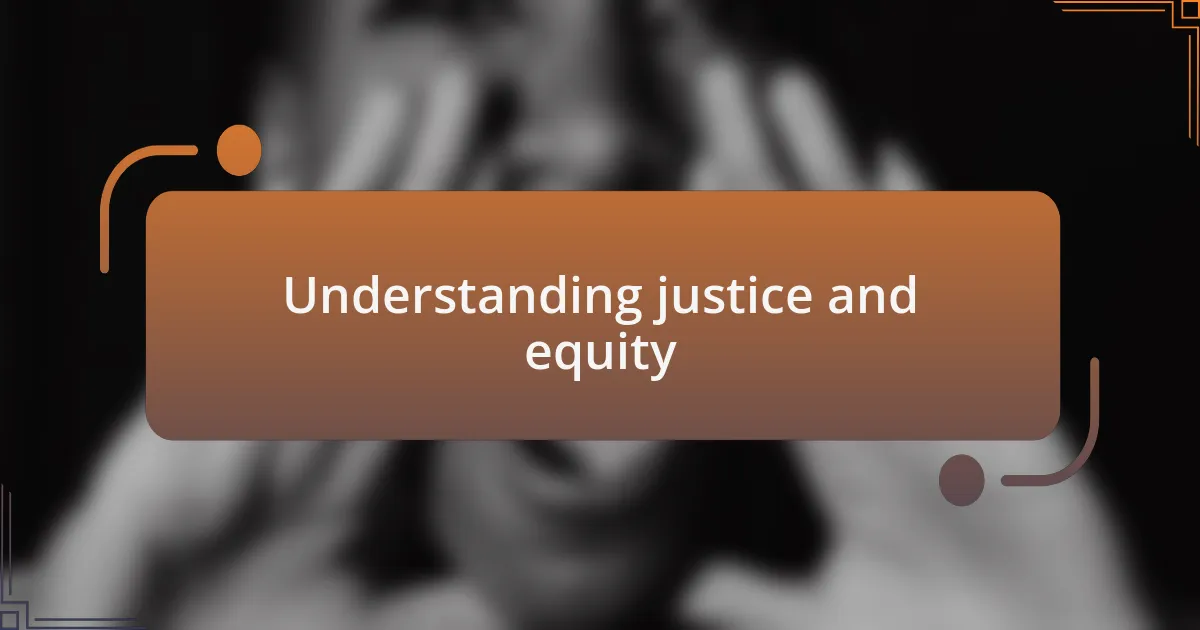
Understanding justice and equity
Justice and equity are often misunderstood as synonyms, but they embody distinct principles. I recall a time when I witnessed a group discussion about social policies. It was eye-opening to see how people equate equal treatment with fairness, yet real equity takes into account the different starting points of individuals, like the hurdles many face in access to education and healthcare.
In my experience, justice is about fairness in how we treat individuals based on their actions, while equity is about ensuring everyone has what they need to thrive. I remember a charity event where resources were allocated based on individual needs rather than a blanket distribution. This approach highlighted to me that true support often requires a tailored strategy, allowing for deeper connection and understanding among diverse individuals.
Consider the question: Can we truly call a society just if it overlooks the disparities faced by its most vulnerable members? The answer lies in recognizing that fairness cannot exist without addressing these inequities. Personal experiences often shape such realizations, prompting me to advocate for a more nuanced understanding of how justice and equity must walk hand in hand to create a truly inclusive environment.
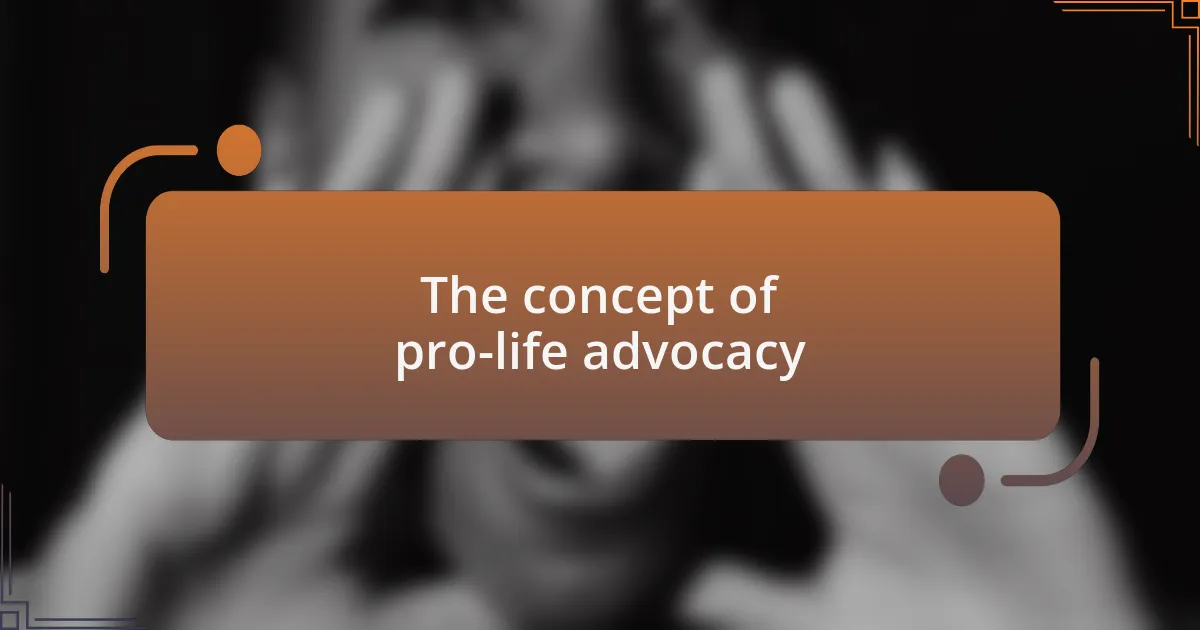
The concept of pro-life advocacy
The concept of pro-life advocacy centers around valuing and protecting life at all stages, from conception to natural death. I remember attending a pro-life rally where I saw countless individuals united by this belief. It struck me how deeply personal experiences fueled their passion, whether it was their own journeys through pregnancy or advocating for those who cannot speak for themselves.
Pro-life advocacy goes beyond just opposing abortion; it encompasses promoting the well-being of mothers, providing support for families, and addressing social issues that affect vulnerable populations. I once volunteered at a crisis pregnancy center where I encountered women facing difficult choices. Their stories revealed the importance of empathy and comprehensive support systems that go hand in hand with pro-life beliefs.
When we think about pro-life advocacy, it raises essential questions: How do we provide sincere care for all life while also supporting those in challenging situations? It’s a delicate balance that requires compassion, understanding, and a commitment to justice that extends beyond the womb. My experiences have taught me that a true pro-life stance advocates for a society where every person receives the care and resources they need to flourish.
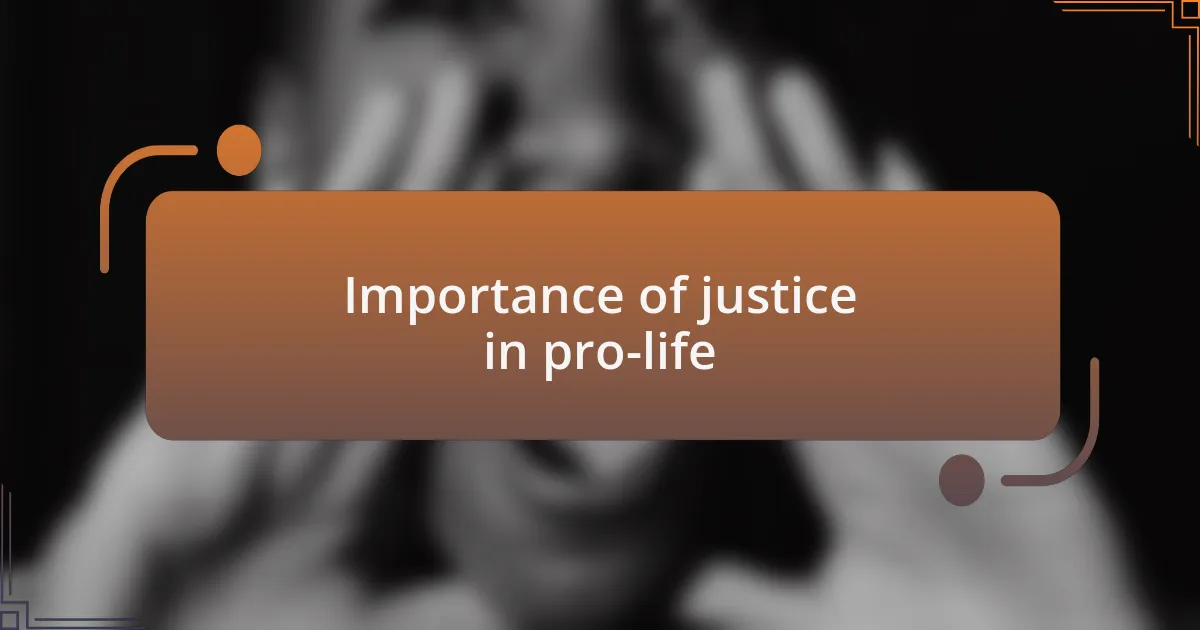
Importance of justice in pro-life
Justice plays a crucial role in pro-life advocacy, ensuring that every individual, from the unborn to the elderly, is treated with dignity and respect. I recall a conversation with a fellow advocate who shared a powerful story about a woman in her eighties, living in isolation and facing neglect. It hit me hard—if we truly value life, we must fight for justice across all stages, not just during pregnancy.
In advocating for pro-life principles, justice demands that we address inequalities that lead to vulnerable situations. I often ponder the reality of systemic issues, like poverty and lack of access to healthcare, that disproportionately affect women in crisis. When I volunteered at a local homeless shelter, I witnessed firsthand how these challenges can push women into difficult decisions regarding their pregnancies. It became clear to me that advocating for justice means actively working to dismantle these barriers.
Justice in the pro-life perspective isn’t just about legislation; it’s about creating an environment where everyone feels valued. I often ask myself: How can we profess to cherish life if we turn a blind eye to the struggles faced by those who live in our communities? It’s a call to action for deeper compassion, pushing me to reflect on how we can better support our neighbors. Ultimately, justice ensures that our pro-life advocacy remains holistic, rooting for the rights and well-being of every person, at every stage of life.
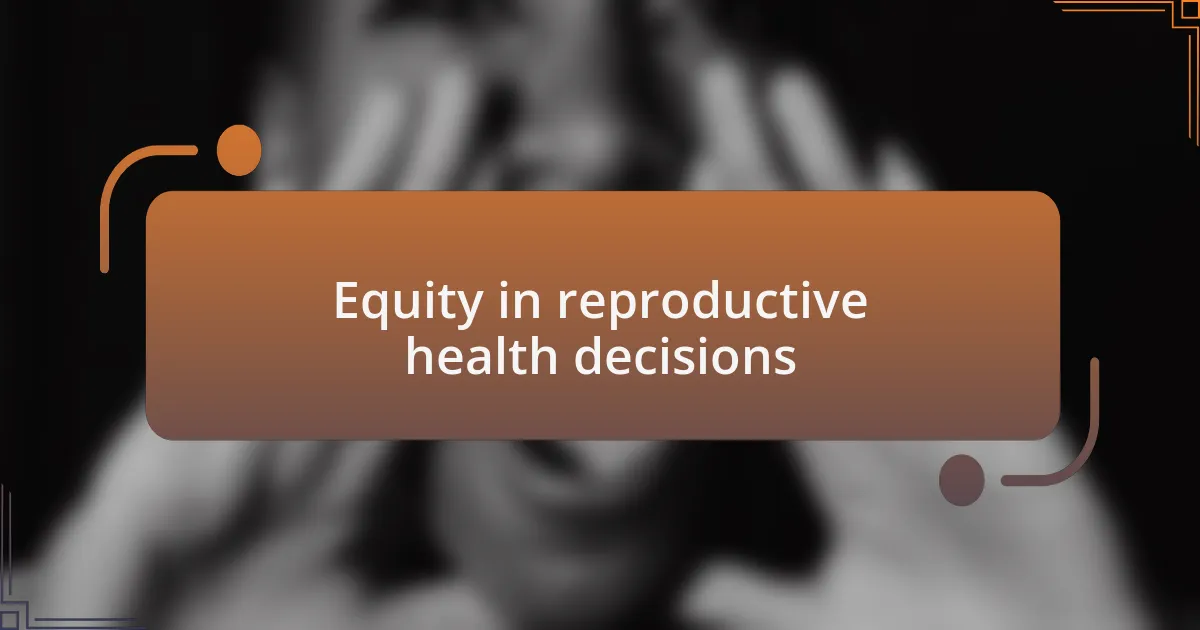
Equity in reproductive health decisions
Equity in reproductive health decisions is essential for creating an environment where every woman can access the care she needs without barriers. I remember a time when a close friend faced an unplanned pregnancy. The stress she felt was compounded by her lack of insurance and the stigma surrounding her situation. How many women find themselves in similar positions, feeling trapped and unsupported in making the choices that are right for them?
In my experience, equitable access to reproductive health means more than just providing medical services; it involves ensuring that every woman feels empowered to make informed decisions about her body and future. While volunteering at a clinic, I met a young mother who shared how parenting resources and counseling made a world of difference for her. When we create supportive networks, we help diminish the isolation that many women face.
The conversation around equity must acknowledge the diverse reality of women’s lives. I often reflect on how different our experiences can be, influenced by factors such as race, income, and education. Isn’t it important for us to address these disparities head-on? By fostering a more equitable approach to reproductive health, we can ensure that every woman feels heard and supported in her choices, ultimately enriching our collective understanding of what it means to stand pro-life.
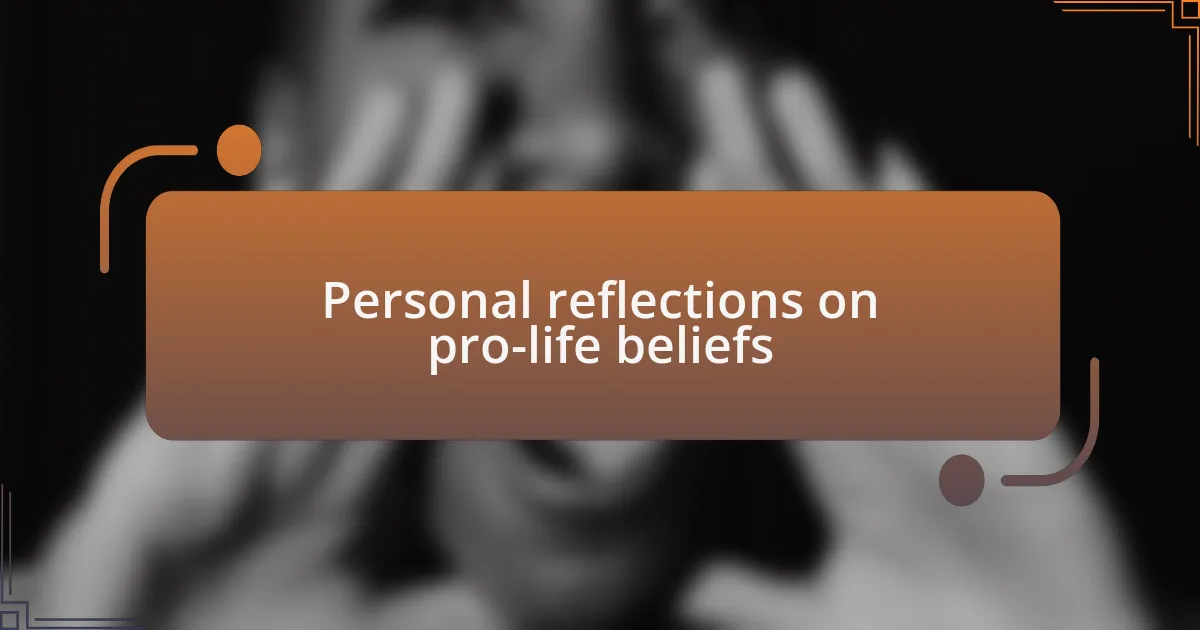
Personal reflections on pro-life beliefs
It’s often in quiet moments of reflection that my pro-life beliefs solidify. A memory comes to mind when I supported a pregnant neighbor who had to navigate countless obstacles just to receive basic prenatal care. I felt a mix of frustration and determination watching her struggle, which sparked my understanding of the urgency for pro-life advocacy that protects both the child and the mother’s rights.
I think about the challenges our society poses to women faced with unplanned pregnancies. When I volunteered for a crisis pregnancy center, I met a woman who had just lost her job and feared what a baby would mean for her future. Her courage to choose life, despite the odds stacked against her, left a profound impact on me. I realized that advocating for life means creating systems that uplift and empower women, not just during pregnancy but throughout their lives.
Through these experiences, I’ve grown to appreciate that pro-life beliefs demand more than just a stance against abortion; they call for a holistic commitment to the well-being of all mothers and their children. How can we expect women to choose life if they don’t feel supported in their circumstances? The more I ponder this, the clearer it becomes to me that advocating for justice and equity in reproductive health is at the heart of genuinely pro-life beliefs.
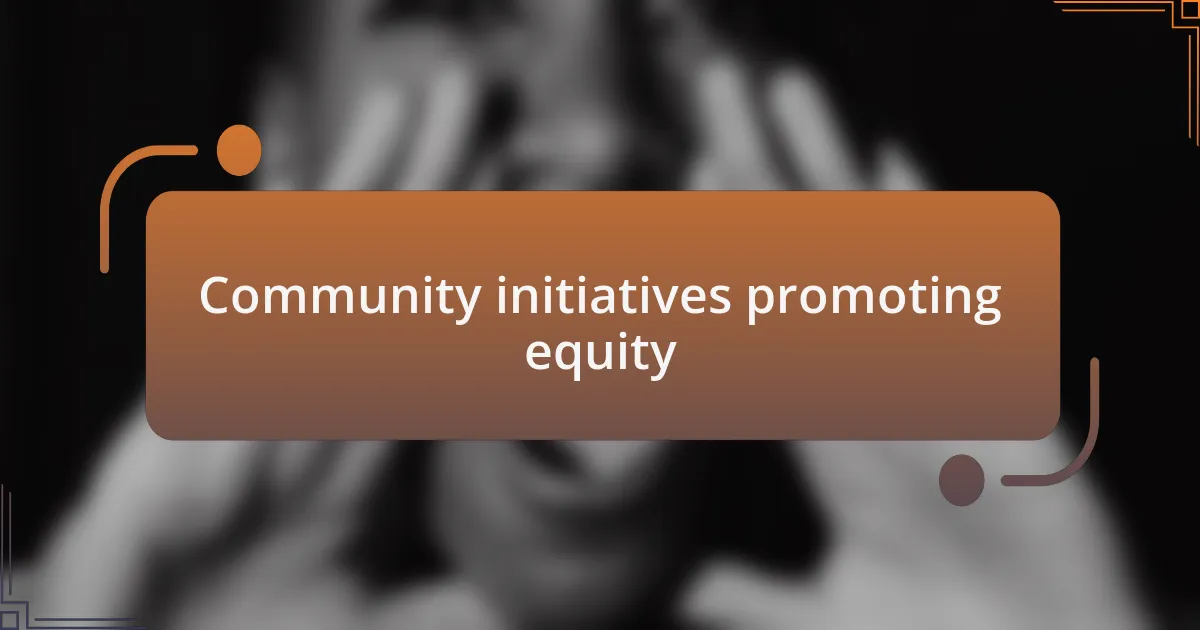
Community initiatives promoting equity
Addressing equity within our communities often starts with grassroots initiatives designed to meet specific needs. I recall attending a local meeting for a non-profit that provided resources to single mothers. The energy in that room was palpable; everyone understood the importance of supporting one another. These community-driven efforts not only provide tangible support but also foster a sense of belonging and solidarity among mothers facing similar challenges.
A striking example I encountered was a community garden initiative that aimed to supply healthy food options for low-income families. One of the mothers involved shared with me how the project transformed her family’s diet and provided a space for connection with other parents. It made me realize the power of collective action in addressing systemic inequalities. How often do we underestimate the impact of such initiatives on building a stronger, more equitable society?
Moreover, mentorship programs can greatly enhance equity by providing guidance and support for young parents. I remember meeting a mentor who matched with a teenager facing an unexpected pregnancy. Their bond grew into a source of encouragement, allowing the young mother to thrive during a critical time in her life. This highlights the significant role mentorship plays in promoting equity—offering not just advice, but real-life examples of resilience and hope.
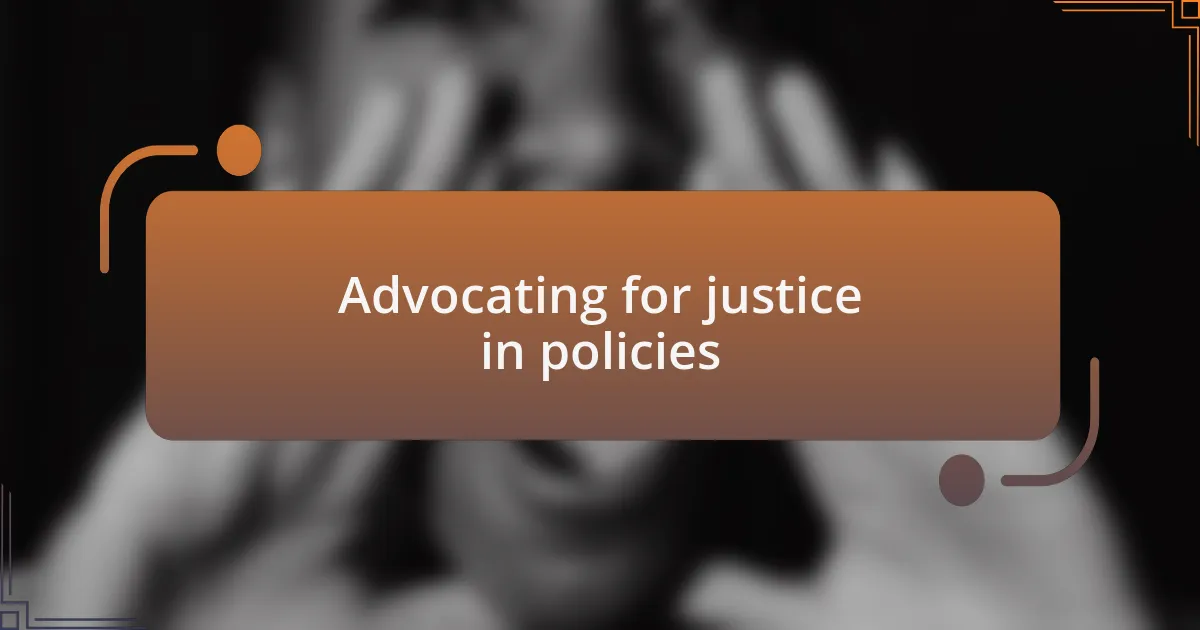
Advocating for justice in policies
Advocating for justice in policies requires us to scrutinize the laws and regulations that govern our society. From my perspective, effective change often hinges on amplifying the voices of those most affected by these policies. For instance, I once met a group of women who shared their stories about the challenges they faced due to restrictive welfare laws. Listening to their experiences made me realize how vital it is to ensure that policies are equitable and truly serve the needs of all individuals.
In my journey through activism, I have often found that advocating for just policies involves a deep commitment to education and awareness. I recall volunteering at a local clinic where we discussed health policy reforms with young mothers. Their questions and insights were profound; they understood firsthand how these policies impacted their access to healthcare. It struck me that empowering individuals with knowledge is a key strategy in the fight for justice—after all, how can we expect policy reform without those directly affected being informed and engaged?
Furthermore, I believe that every conversation about policy reform should include a focus on inclusivity. During a town hall meeting, I experienced the power of diverse perspectives firsthand. A single father spoke passionately about the need for family-friendly work policies, which resonated with many in the room. His story reminded me that justice in policy is not just about numbers or statistics; it’s personal and should reflect the multifaceted lives of those it aims to serve. Could there be a more compelling reason to advocate for change than the transformative impact it has on individuals and families?